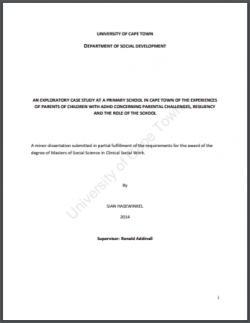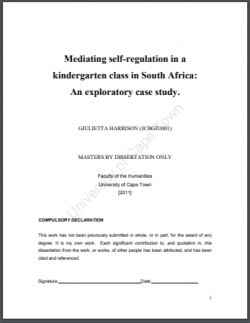An exploratory case study at Timour Hall Primary School of the perception of parents of children with ADHD concerning their parental challenges and coping strategies

Type
Thesis
Authors
Category
ECCE, Foundation, Intermediate, Senior
[ Browse Items ]
Publication Year
2015
Publisher
URL
[ private ]
Pages
193 p.
Subject
Early childhood education, Primary education, Children with ADHD, Vulnerable children, Parents, Challenges, Resilience, School's role, Social workers, South Africa
Tags
Abstract
This phenomenological study seeks to understand challenges and resilient adaptations of parents of children with ADHD at a Primary School in Cape Town, and to examine the role of the school and the school social worker in supporting parents not only in developing parental resilience, but also developing resiliency in their relationships with the school as an adjunct to forging effective parent-school partnerships. The macro systemic background to this study is the Department of Basic Education’s policy on Inclusive Education, which calls for parent-school partnerships in educating vulnerable children. Two theoretical frameworks guide this study: resiliency theory, given the increasing calls for resiliency research in resource-poor contexts; and Bronfenbrenner’s bioecological framework, as ADHD is a complex phenomenon in which parents and school, both micro- and meso-systemically, buffer the impact of ADHD. The research methodology is an exploratory qualitative cross-sectional single case design with multiple respondents. Eighteen parents were the unit of study, selected according to a purposive and discriminant sampling design. Data was collected using a semi-structured interview schedule and recorded during an in-depth interview. This study confirmed chronic and overwhelming personal and parenting challenges but also challenges around medication and parent-school interaction. Participants struggled more than they felt they succeeded, as adaptations shadowed and were overshadowed by, challenges. Participants increasingly used the services of the school social worker and preferred to access personal help via their children’s mental health provider, underlining the importance of the school as an intervention site. Participants indicated that school social work services should provide counselling, a support group for parents, advocacy and mediation between parent and teacher/school, and develop opportunities for parent-school partnerships. School social work services were valued because they were based on knowledge and experience. Relationships with the school were tempered by ambivalence and frustration; participants wanted proactive teachers providing in-depth and accessible contact and trained in ADHD classroom management. Implications of this study for the school, the social work profession and the Department of Basic Education are discussed.
Description
Thesis (MSocSc)--University of Cape Town, 2015
Number of Copies
1
| Library | Accession No | Call No | Copy No | Edition | Location | Availability |
|---|---|---|---|---|---|---|
| Main | 799 | 1 | Yes |

